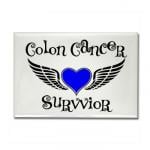Reading Room: 5-minute colon cancer test could save thousands

Comments
-
Hmmm..
Re:
"In Britain, people aged 60 to 74 are tested every other year with
a fecal blood test. In the U.S., colonoscopies — 20-minute scans
of the entire colon that require sedation — are common, even
though no trials have proved they work for cancer screening. Use
of the flexi-scope test has plummeted in the U.S. because
colonoscopies are perceived as being better."
Note:
"To find polyps or to detect cancer early, the American Cancer
Society recommends several options for people over 50: a
flexi-scope test, double-contrast barium enema or virtual
colonoscopy every five years or a colonoscopy every 10 years."
From : 5-minute colon cancer test
It sounds a lil' preposterous, since a Sigmoid colonoscopy or "flexi-scope"
misses the upper colon completely (doesn't go in that far). Most
colon cancers that progress to the point of an obstruction, are in the
upper sections of the colon where only a complete colonoscopy
will suffice.
My cancer was said to have taken 7-8 years to get as big as
it was, growing through one section of colon, and into the next.
No usual tests ever indicated I ever had anything at all wrong
going on inside me. I was never offered a colonoscopy, and that
test -would- have indicated the growth, while a Sigmoid colonoscopy
or "flexi-scope" would not have.
With the recent news regarding "double-contrast barium enemas"
causing cancer, and "virtual colonoscopy" also being a cause of cancer,
it makes me wonder why the ACS approves of either.
I've been questioning a lot of things lately.
Good health.
John0 -
Digging DeeperJohn23 said:Hmmm..
Re:
"In Britain, people aged 60 to 74 are tested every other year with
a fecal blood test. In the U.S., colonoscopies — 20-minute scans
of the entire colon that require sedation — are common, even
though no trials have proved they work for cancer screening. Use
of the flexi-scope test has plummeted in the U.S. because
colonoscopies are perceived as being better."
Note:
"To find polyps or to detect cancer early, the American Cancer
Society recommends several options for people over 50: a
flexi-scope test, double-contrast barium enema or virtual
colonoscopy every five years or a colonoscopy every 10 years."
From : 5-minute colon cancer test
It sounds a lil' preposterous, since a Sigmoid colonoscopy or "flexi-scope"
misses the upper colon completely (doesn't go in that far). Most
colon cancers that progress to the point of an obstruction, are in the
upper sections of the colon where only a complete colonoscopy
will suffice.
My cancer was said to have taken 7-8 years to get as big as
it was, growing through one section of colon, and into the next.
No usual tests ever indicated I ever had anything at all wrong
going on inside me. I was never offered a colonoscopy, and that
test -would- have indicated the growth, while a Sigmoid colonoscopy
or "flexi-scope" would not have.
With the recent news regarding "double-contrast barium enemas"
causing cancer, and "virtual colonoscopy" also being a cause of cancer,
it makes me wonder why the ACS approves of either.
I've been questioning a lot of things lately.
Good health.
John
Hi John, I looked at the article and saw these other related passages:
Dr. David Ransohoff of the departments of medicine and epidemiology, University of North Carolina at Chapel Hill, North Carolina, said the Lancet findings might make doctors rethink whether the less-invasive flexi-scope test to scan the lower bowel, plus a highly sensitive fecal blood test to scan the upper bowel, could be better than a colonoscopy. Ransohoff was not linked to the study and wrote an accompanying commentary in the Lancet.
Ransohoff said the finding the test only needed to be done once in a person's lifetime was "striking" and further follow-up was necessary to see just how long this protective effect lasts.
Dr. Durado Brooks, director of prostate and colorectal cancer at the American Cancer Society, said the study results would not change their colon cancer screening guidelines.
"We have long included (flexi-scope) tests as one of our preferred tests to prevent disease," he said. "I would hope clinicians look at this information and recognize there is some value in this test."
So they do feel that using a "highly sensitive fecal blood test to scan the upper bowel" along with the flexi-scope test to scan the lower bowel could be better than just a colonoscopy. That possibly could have detected something wrong in the upper bowel.
I tried to find information on double-contrast barium enemas and virtual colonoscopies causing cancer but could not find any info on that at all. I'm not saying what you say is false, I'm just saying I could not find any info on it using a standard Google search.
Just wondering, did you have the standard colonoscopy done at age 50 as recommended? I was diagnosed at 46 so I didn't have one since there was no obstruction and no family history of cancer at all.
Overall I thought the study gave some new possibly better options for trying to detect colon cancer. Overall though, given the diet of most Americans I do think they should lower the age to be tested from 50 to 40.
Hope all is well...
-phil0
Discussion Boards
- All Discussion Boards
- 6 CSN Information
- 6 Welcome to CSN
- 122.5K Cancer specific
- 2.8K Anal Cancer
- 455 Bladder Cancer
- 311 Bone Cancers
- 1.6K Brain Cancer
- 28.6K Breast Cancer
- 406 Childhood Cancers
- 27.9K Colorectal Cancer
- 4.6K Esophageal Cancer
- 1.2K Gynecological Cancers (other than ovarian and uterine)
- 13K Head and Neck Cancer
- 6.4K Kidney Cancer
- 681 Leukemia
- 801 Liver Cancer
- 4.2K Lung Cancer
- 5.1K Lymphoma (Hodgkin and Non-Hodgkin)
- 242 Multiple Myeloma
- 7.2K Ovarian Cancer
- 69 Pancreatic Cancer
- 493 Peritoneal Cancer
- 5.6K Prostate Cancer
- 1.2K Rare and Other Cancers
- 544 Sarcoma
- 742 Skin Cancer
- 659 Stomach Cancer
- 192 Testicular Cancer
- 1.5K Thyroid Cancer
- 5.9K Uterine/Endometrial Cancer
- 6.4K Lifestyle Discussion Boards

